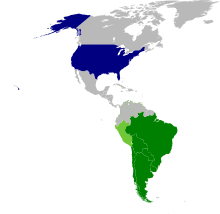兀鷹行動
外觀
此條目需要補充更多來源。 (2019年6月14日) |
| 兀鷹行動 | |
|---|---|
| 冷戰的一部分 | |
 (深綠色)主要成員︰ 阿根廷、玻利維亞、巴西、智利、巴拉圭、烏拉圭 (淺綠色)其他成員: 哥倫比亞、秘魯、委內瑞拉 (藍色)主導者及財政支援者:美國 | |
| 行動種類 | 隱蔽行動 |
| 地點 | 南美洲 |
| 目標 | 左派同情者(包括裴隆主義、共產主義者和社會主義者)以及南美軍政府的反對者 |
| 作戰單位 | 各參與國的情報機構 |
| 計劃者 | 支持: |
| 指揮者 | 支持: |
| 日期 | 1968–1989年 |
| 結果 | 行動在柏林圍牆倒塌後結束 |
| 傷亡人數 | 60,000-80,000名左翼同情者被處決[7] 400-500人在跨境行動中喪生[7] 超過40萬名政治犯 |
兀鷹行動(西班牙語:Operación Cóndor,葡萄牙語:Operação Condor,英語:Operation Condor)是一項由美國支持、在南美洲蒐集情報和暗殺對手的政治迫害和國家恐怖主義行動。[8]它於1968年開始,1975年在南美洲南錐體的右翼獨裁國家正式實施,領導人有豪爾赫·拉斐爾·魏地拉、烏戈·班塞爾、翁貝托·德·阿倫卡爾·卡斯特略·布朗庫、阿圖爾·達科斯塔·伊·席爾瓦、奧古斯托·皮諾切特、法蘭西斯科·莫拉萊斯·貝穆德斯、阿爾弗雷多·斯特羅斯納和阿帕里西奧·門德斯。它的目的是剷除共產主義與蘇聯的影響,並抑制成員國政府的反對派運動。
由於其秘密性質,兀鷹行動直接造成死亡的人數備受爭議,保守估計至少有60,000人死亡,其中大約30,000人死在阿根廷,受害者包括政壇的異見人士及左翼分子、工業及農業界組織的領袖、天主教會的神父和修女、學界的知識分子及師生、游擊隊員以及任何被懷疑反政府的人士。[9][10]
兀鷹行動的主要成員國包括阿根廷、智利、烏拉圭、巴拉圭、玻利維亞和巴西。[11][12]美國多任政府都為軍政府提供了技術支持、酷刑培訓和軍事援助,包括詹森、尼克森、福特、卡特和雷根政府,[13]這種支持經常通過中央情報局提供及協調。[13]
參考文獻
[編輯]- ^ McSherry, J. Patrice. Chapter 5: "Industrial repression" and Operation Condor in Latin America. Esparza, Marcia; Huttenbach, Henry R.; Feierstein, Daniel (編). State Violence and Genocide in Latin America: The Cold War Years (Critical Terrorism Studies). Routledge. 2009: 107, 111 [2022-01-29]. ISBN 978-0415664578. (原始內容存檔於2018-07-19).
- ^ Greg Grandin (2011). The Last Colonial Massacre: Latin America in the Cold War (頁面存檔備份,存於網際網路檔案館). University of Chicago Press. p. 75 (頁面存檔備份,存於網際網路檔案館). ISBN 9780226306902.
- ^ Walter L. Hixson (2009). The Myth of American Diplomacy: National Identity and U.S. Foreign Policy (頁面存檔備份,存於網際網路檔案館). Yale University Press. p. 223 (頁面存檔備份,存於網際網路檔案館). ISBN 0300151314.
- ^ Maxwell, Kenneth. "The Case of the Missing Letter in Foreign Affairs: Kissinger, Pinochet and Operation Condor". David Rockefeller Center for Latin American Studies (DRCLAS), Harvard University. 2004 [2022-01-29]. (原始內容存檔於2022-05-05) (英語).
- ^ Dalenogare Neto, Waldemar. Os Estados Unidos e a Operação Condor. 2020-03-30 [2022-05-30]. (原始內容存檔於2022-05-05).
- ^ McSherry, J. Patrice. Operation Condor: Clandestine Inter-American System. Social Justice. 1999, 26 (4 (78)): 144–174 [2022-01-29]. ISSN 1043-1578. JSTOR 29767180. (原始內容存檔於2022-05-05).
- ^ 7.0 7.1 Bevins, Vincent. The Jakarta Method: Washington's Anticommunist Crusade and the Mass Murder Program that Shaped Our World. PublicAffairs. 2020: 266–267. ISBN 978-1541742406.
- ^ Blakeley, Ruth (2009). State Terrorism and Neoliberalism: The North in the South (頁面存檔備份,存於網際網路檔案館). Routledge. ISBN 0415686172
- ^ Victor Flores Olea. Editoriales – Operacion Condor. El Universal. Mexico. 10 April 2006 [24 March 2009]. (原始內容存檔於2007-06-28) (西班牙語).
- ^ Larry Rohter (January 24, 2014). Exposing the Legacy of Operation Condor (頁面存檔備份,存於網際網路檔案館). The New York Times. Retrieved August 26, 2015.
- ^ Stanley, Ruth. Predatory States. Operation Condor and Covert War in Latin America/When States Kill. Latin America, the U.S., and Technologies of Terror. Journal of Third World Studies. 2006 [2021-09-17]. (原始內容存檔於2008-12-29).
- ^ McSherry, J. Patrice. Chapter 5: "Industrial repression" and Operation Condor in Latin America. Esparza, Marcia; Huttenbach, Henry R.; Feierstein, Daniel (編). State Violence and Genocide in Latin America: The Cold War Years (Critical Terrorism Studies). Routledge. 2011: 108 [2022-01-29]. ISBN 978-0415664578. (原始內容存檔於2018-07-19).
- ^ 13.0 13.1 Operation Condor: the cold war conspiracy that terrorised South America. the Guardian. 2020-09-03 [2021-10-06]. (原始內容存檔於2022-05-17) (英語).
外部連結
[編輯]- 邱稔壤. 從政治外交層面看南錐禿鷹行動引發之人權爭議: 以智利皮諾契政權為例. 印刻出版. 2002年. ISBN 978-957-30142-7-0.
